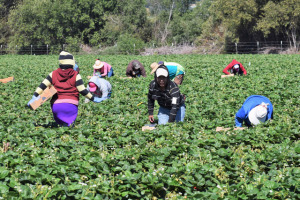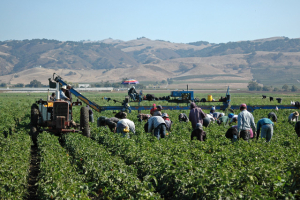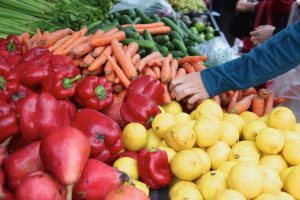US Farmers And Ranchers Begin With A Monologue While Consumers Want A Dialogue
September 30, 2011 Michael R. DimockThe newly formed and already much discussed U.S. Farmers and Ranchers Alliance recently commissioned a national survey. It showed that slightly more American’s feel the food system is headed in the wrong direction (42%) than think it is headed in the right one (39%). Nineteen percent don’t know. Results also showed that consumers want more clarity about the effect of regulation, pesticide and antibiotic use, genetic engineering, and animal agriculture. Research on adoption and diffusion of ideas, indicates that only 20% need to believe something to have that idea permanently imbedded within a population. Once imbedded an idea can predominate with the right conditions. So naturally the survey data is worrying the nation’s farmers and ranchers.
To some in the production agriculture world this data means they have a communication problem that can be fixed by educating consumers to set them straight. To those seeking a totally alternative system it confirms that agriculture has problems that can only be fixed by becoming organic and small scale. To Roots of Change the data clarifies that the strategic context has shifted and we have arrived at a rich and potentially transformative moment for our food system.
In response to the data, on September 22, the Alliance hosted the “Food Dialogues,” a social media event featuring 22 panelists divided among four locations interacting through moderators with the thousands of people via Facebook and Twitter. The event’s stated goal was to “find common ground” around the most “pressing problems.” As a believer in the power of dialogue, I accepted an invitation to participate in the UC Davis panel. Reflecting on the first try, I have some thoughts to share with the farmers and ranchers and Alliance leadership focused on the Food Dialogues.
Based on the posted comments, most folks from production agriculture felt good about the event and those with concerns still have them. The New York Times coverage called the Alliance a “public-relations campaign,” which should be a warning to its organizers if they really seek dialogue. Maybe agriculture’s satisfaction comes from feeling that farmers and ranchers were heard because they were able to state their viewpoint without interruption. Unfortunately, stating one’s viewpoint is only the first small step in the hard work of finding common ground.
Production agriculture’s real problem is rebuilding trust with the 42%. People want to trust that farmers and ranchers are on the right track, but there are legitimate concerns based on facts that are not being addressed. AND, there are some illegitimate concerns based on a lack of information, misinformation or misunderstanding. Dealing with trust problem first will make it easier to fix the information problem later.
Dialogue is the right treatment for mistrust. Roots of Change has found dialogue to be transformative for relationships between agricultural producers and change advocates in California. But to get to transformation, a dialogue requires that all parties acknowledge and respect the others’ concerns and that participants are willing to be completely honest and mutually vulnerable.
During the entire event, I am not sure I heard one farmer or rancher say that any concern raised was legitimate or even worth exploring. Instead, farmers and ranchers would address concerns by saying that they only do what must be done. Then they moved on to the next issue. That approach ends the dialogue before it begins.
The most glaring dialogue killer for me related to antibiotic use in animal agriculture. When the issue was first raised, not one panelist mentioned sub-therapeutic antibiotics, which are the primary concern. When I pointedly asked about them, the response from a cow-calf operator was, “I” use sub therapeutic antibiotics for “animal health” reasons. There was no acknowledgement of the concerns of public health experts or consumers. There was no acknowledgement of the differences in usage between a relatively small cow-calf producer and a huge confinement hog operation. At best these responses were evasive half-truths; at worst, practiced obfuscation.
A truly dialogic response might have gone like this: “Yes, the livestock industry has heard the concerns of the medical community and consumers related to sub-therapeutic antibiotics. Our industry wants to preserve the power of antibiotics to save lives. Here is what we are doing to address the issue…..In fact, we would like the American people to join us in asking Congress to include more research funds in the next Farm Bill that will help us with this challenge.” Producers and consumers could emerge from that type of response as allies based on common ground.
Some tell me that the livestock industry could never say anything like the above because economic and production needs of concentrated animal feeding operations (CAFO) require use of sub therapeutic antibiotics. Maybe that is true, but let’s hear that from the producers. An honest answer would move the dialogue into the economic realities of a global economy as well as the risks and benefits of CAFO production. Economic survival of livestock producers is a legitimate concern and it should be one shared by consumers because US food production is a strategic need, not a luxury. Humanity’s ability to kill bacterial infections is also a strategic need. Americans want to know that our livestock producers feel and act on a moral obligation to protect antibiotics. Good dialogue leads to thorough exploration and the systemic thinking required to solve complex problems.
Another failure to build real understanding occurred when our UC Davis panel moderator pressed a cattleman to define “natural” beef. He began by saying that "natural" meant “transparency” in production practices. Yet he only specified that his meat was higher quality based on a “special ration” that comes from his land and is expensive. He did not clarify why a consumer might feel assured that “natural” is an appropriate description. He did not admit that “natural” actually means little from a regulatory standpoint.
A proactive response to Jane’s question might have been, “to us natural means we seek to mimic a natural biological system. We tend our land to build healthy soil and maintain clean water and we feed our animals grass, their natural diet. So when you eat our meat, it is meat humans have evolved to eat. It’s natural.” Such an answer may not be possible for most ranchers, but each one needs to say why they call it “natural” in a clear statement. Building trust around the term “natural” is the best way to keep it from being further regulated, a concern of many farmers and ranchers. A clear answer engenders trust and will help assure consumers that the food system is headed in the right direction.
If there is a second dialogue, I’d like to suggest three refinements: 1) allow one change advocate to be on each panel 2) use clearly unbiased and informed facilitators to support searching and fearless conversations on fewer topics 3) include farmers and ranchers who will acknowledge concerns and speak to them. The last suggestion might mean you don’t include elected leaders who feel constrained by politics within their industries. Effective dialogue is easier to achieve when participants do not worry about having their heads lopped off by constituents.
If farmers and ranchers, change advocates and concerned consumers speak the truth anything could happen. Some Alliance funders hoping to avoid certain topics might be lost and new ones might be found. Freedom to explore through a real dialogue would allow all participants to evolve their positions and find common ground. Then we’d be poised to move forward to solve the most pressing problems in the food system. But if a PR-oriented monologue continues, given the savvy nature of most consumers today, the $11 million budget of the Alliance will be money wasted.
To read more on the US Farmers and Ranchers Alliance, please check out the following:



